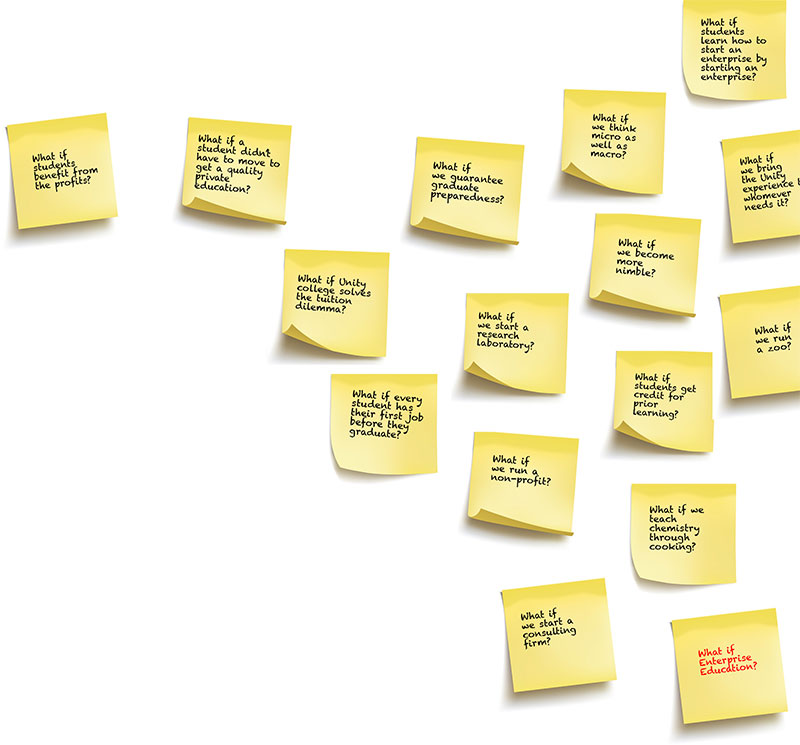On one of the first fine spring days of 2017, Dr. Melik Peter Khoury stood before an eager faculty and staff at the Unity College Center for the Arts and shared the much-anticipated results of the Strategic Branding Initiative. Known colloquially as the “Deep Dive,” the Strategic Branding Initiative was a four-year, $450,000 project funded largely through the gift of an anonymous donor.
“Some of you asked me: you’ve been president for some time now, how come you haven’t laid a claim for where we should go?” Khoury said. “I felt it would be premature to do that on my first day. It would be premature to do that in my first month. I had some hunches, but I wanted the data to come in.”
And now the data is in. Lots of it. Thousands of pages of data generated by dozens of experts; upwards of 100 college faculty, staff, and students; hundreds of prospective students; and hundreds of hours of research by twenty marketing professionals across four different firms.
In the end, the Deep Dive came down to one question: How can Unity College redefine higher education to create the future leaders of the sustainability century?
As Khoury put it on that day in May, “The question we needed to ask is not just about the survival of Unity College, but the survival of our brand of education.” The breadth and stakes of the question might worry other leadership teams, but as President Khoury announced earlier in the day, this college is intrepid.
Building a Beacon: Unity College Brand Strategy is the culminating strategy document of the Deep Dive as developed from the combination of Deep Dive research with support from marketing firm Brand Alchemy. Building a Beacon was endorsed by the Board of Trustees on May 12, 2017 and provided the substance for Dr. Khoury’s remarks on May 16, 2017.
Deep Dive research identified several, often contradictory forces at work in a higher education industry in extreme flux. For example, the need for colleges to increase revenue seems to run counter to students’ need to keep college costs down and employers’ desires for new employees who are well prepared and can focus on work and not on their debt.
How to address this historically epic collision of college, marketplace, and student forces? How to offer a new way forward for small, private higher education? Good questions.
Why not Enterprise Education?
Why not learn by doing through an ENTERPRISE MODEL?
According to research by the Stamats marketing firm, students highly value co-ops, internships, and work experience. No surprise. Many of us find that we learn best by doing and, although the conversation continues about exactly what “learning by doing” means, experts agree that applying knowledge helps us learn and retain that knowledge.
A 2015 study in Psychological Science finds that learning by doing helps students perform better in science. More generally, the Non-Destructive Testing Resource Center, a National Science Foundation supported initiative, reports that the only learning activity with better information retention than “Practice by doing,” at 75% retention, is “Teach others / immediate use of learning,” which shows a 90% information retention percentage. By comparison, lecture-based learning shows merely 5% retention.
“You know, I hate the saying those who can’t do, teach. I hate it. At Unity College we know that our faculty do and teach,” President Khoury is fond of saying. As part of the Deep Dive, Unity College asked lots of “what ifs.” What if we took our students learning and financial needs seriously? And what if we leveraged our faculty capacity for professional practice and academic research to meet those student learning needs? And what if our students, faculty, and staff did the work of learning in the very places where the learning will need to be applied? And what if the revenue helped defray tuition costs? Why wouldn’t we? What if we did?
For example, instead of a sustainable agriculture program having a demonstration plot just outside the classroom, Unity College leaders are asking why wouldn’t we teach students to run our farm? An actual farm. McKay Farm. A farm that could grow student jobs and produce. A farm that raises greens as well as revenue. Why wouldn’t we?”
Why wouldn’t we teach students to run a meat rabbit business out of our Animal Barn? Or run a non-profit focused on ending meat rabbits? Or what if our students run for-profit events in our events center? Or develop a new farm-to-table restaurant? And why wouldn’t we support student learning situationally, when students feel the need and are most ready to learn, through online or onsite project management, communication, or math certifications? And, for goodness sakes, why wouldn’t we use the revenue from these sustainable enterprises to help keep tuition at bay?
Why not? After conversations with the New England Association Schools and Colleges (Unity College’s accrediting agency), research into the latest learning and student development theory, and the receipt of the results from all facets of the Deep Dive, Unity College leadership, board of trustees members, and president have decided that there is no reason why not. There is no market, learning, service, or mission reason not to involve students in the development and management of real-life enterprises. There is no reason not to engage students in development and management of social enterprises, business enterprises, revenue-generating enterprises, and not-for-profit enterprises. No reason at all.
Building a Beacon: Unity College Brand Strategy refers to this sort of learning-by-doing through engagement in real-world social and economic entrepreneurship as “Enterprise Education.” “Enterprise Education is the real life, revenue generating manifestation of our curriculum.” Why not Enterprise Education?
Why not account for learning through a NEW CURRICULAR CURRENCY?
So Unity is in the process of reimagining the relationship between the classroom, the teacher, and the material. What hasn’t changed much to this point is the basic educational accounting formula of time on task resulting in credit generation and eventually a diploma. Many colleges are trying to rethink even that.
According to research by NowWhat, the marketing research firm engaged toward the beginning of Deep Dive in order to conduct market and social environment assessment, at least 600 postsecondary institutions are exploring or developing alternative ways of accounting for student learning through competency-based models.
A competency model for assessing learning and assigning credit, focuses more on results — the learning students achieve — than on the tactics faculty use for teaching. More on outcomes than inputs. More on growth than on seat time, number of pages written, or number of quizzes aced.
Advocates for results-oriented assessment argue that it provides a more realistic measure of student achievement. When executed precisely, a results-system can also be the basis for assigning students credit for prior learning (think of giving credit to a member of the armed forces who goes back to school with real world skills). Results-based academic accounting can also be an effective means of communicating actual skills and preparedness to potential employers and graduate schools.
As part of the Unity College brand strategy, as imagined in Building a Beacon, Unity College should help higher education rethink its current factory model and help students get off the credit accumulation conveyor belt by developing a “new currency” for academic credits and explore a results-oriented model for academic accounting.
Why not provide borderless and seamless education on
THE ROAD TO UNITY?
Under a projected banner reading, “THE ROAD TO UNITY,” President Khoury declared, “While Unity College in Maine will remain home base, a host of other locations will be actively targeted, including partnerships with community colleges and other institutions, making Unity more inclusive, accessible and available.”
“Unity College is like Air Force One. Whenever the President of the United States flies, no matter in what plane, that is Air Force One. Unity College is like that,” President Khoury explains.
In his commencement address three days before the campus-wide unveiling of Building a Beacon: Unity College Brand Strategy, Dr. Khoury addressed the issue this way with Unity’s newest alumni:
We love you graduates, but we cannot continue to call ourselves America’s Environmental College if the Unity experience is available only to a small sampling of those who need our brand of education.
If Unity College demonstrates the courage of our convictions, if we really begin to achieve the mission of America’s Environmental College, we will bring the Unity experience to the places where we are needed most. Adult learners should not be expected to uproot their families and quit their jobs. Sustainability leaders should not be forced to leave the cities, countries, and villages that need them most to get the education that will help them serve.
And, although four years here, at the small Unity College Flagship, will remain the cornerstone of our educational offerings, young people should not be required to put their lives on hold while they attend college.
As part of the Unity College brand strategy in Building a Beacon, Unity College has a responsibility to expand its reach by providing Enterprise Education “Seamlessly and borderlessly. Online and offline. Onsite and offsite.”
One Fine Day in May
“I think we have achieved a nice compromise here where we are allowing the residential and those who believe in it to stay, but we are free to roam around Maine, the country, and hopefully, the world,” Khoury explained to the crowd gathered at the Unity College Center for the Performing Arts.
“This is what I hope you are excited about as we fulfill our mission… Our unique and disruptive strategy addresses all forces; those of the college, the student and the marketplace. That is what will differentiate us… And that is what we will brand as Enterprise Education as America’s Environmental College. That is what I believe is our future…”
“Questions? You’ve been waiting for my answer for what do we do. There it is,” Khoury finished.
The first question was from Dr. Kevin Spigel, Professor of Geology, “So, as a small private [college], we can either get busy living or get busy dying?”
“Yes,” said Khoury
“You’ve outlined a bunch of ideas and strategies about moving forward. How?
What’s next?” asked Spigel.
We’re glad you asked, Dr. Spigel. We’re glad you asked.







